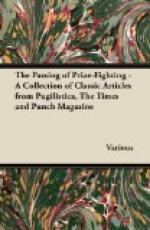At first it seemed as if Mr. PROTHERO, in moving the second reading of the Corn Production Bill, was going to adopt the modern attitude of insouciance, for he spoke of it as “bristling with controversial points” (as if it were intended to promote the growth of quite another kind of corn), and observed that he himself had originally been opposed to State interference with agriculture. But he soon warmed to his work, and spoke with all the zeal of the convert. Among his most appreciative listeners were the occupants of the Peers’ Gallery—the Duke of MARLBOROUGH, who has transformed the sword of Blenheim into a ploughshare, and Viscount CHAPLIN, to whom the announcement of State bounties for wheat-growing seems like the arrival of the Millennium.
Another ex-Minister of Agriculture was, to put it mildly, less enthusiastic. I should be doing Mr. RUNCIMAN little injustice to say that for the moment the politician in him rose superior to the patriot. If after the War the old party-quarrels are to break out again with all their fatal futility I can imagine that Liberal wire-pullers in the rural districts will be much embarrassed by the existence of bounties which economically they cannot approve but which politically they dare not remove. But surely we shall have learned our lesson badly if the old strife of Tory and Liberal is to be revived in all its former virulence and sterility. Besides there is the Labour Party to be considered, as Mr. GEORGE ROBERTS reminded the House in the best speech he has made since he went on the Treasury Bench. He pointed out that if high wages and good conditions were to be secured for agricultural workers the prosperity of the agricultural industry as a whole must be ensured; and he hoped that the policy of State-aid would not stop there. No wonder the hard-shell Free Traders looked glum.
Sir HEDWORTH MEUX must be careful or he will jeopardize his reputation as a humourist. Mr. PARTINGTON having asked whether the Government would put down their racehorses, the gallant Admiral could think of no better jest than that the proposal was as futile as that of the hon. Member’s namesake, who endeavoured to keep out the Atlantic with a mop. Shortly afterwards Mr. YEO asked whether the Government would consider the destruction of cats, with a view, perhaps, to the suppression of MEUX.
The Corn Production Bill had to run the gauntlet of a good many criticisms during the second day’s debate. The unkindest cut of all was delivered by the SPEAKER. Mr. MOLTENO had asked whether Members who were landowners or farmers might vote on a measure affecting their financial interests, and Mr. LOWTHER replied that the benefits were “so problematical and so uncertain” that he thought they might. Mr. MOLTENO used his freedom to vote against the Second Reading; but only a handful of Members followed his example. Mr. RUNCIMAN and his friends decided that abstention was the better part of valour.




